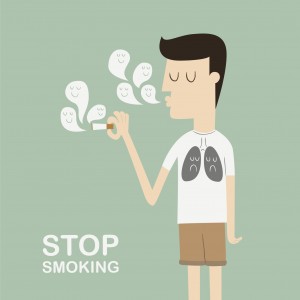
Smoking is the main preventable cause of premature illness and death worldwide. Approximately 20% of deaths in men and 5% in woman over 30 can be attributed to smoking. The World Health Organization (WHO) estimates that 6 million people die from smoking related disease each year, with tobacco being the number one risk factor for non-communicable disease deaths. Indeed, the WHO views reducing tobacco use as a priority with today’s World No Tobacco Day campaigning for a ban on tobacco advertising to reduce uptake of smoking.
But what of those people already addicted to tobacco? Quitting smoking can significantly improve health and wellbeing; unfortunately, many smokers find it difficult to achieve permanent abstinence without support.

There are lots of treatments available for people who want to stop smoking
A number of drug treatments are available to help people to quit smoking. The three most widely used types of treatment are; nicotine replacement therapies (NRT), bupropion (an antidepressant) and varenicline (a nicotine receptor partial agonist), all of which are licensed for use in Europe and the United States. Bupropion and varenicline are available on prescription, whist NRTs such as patches and gums are also available over the counter.
Treatments such as cytisine have also been used in other countries as a potential intervention, but are not yet widely available. Other therapies such as anxiolytics, selective serotonin reuptake inhibitors (SSRI’s), monoamine oxidase inhibitors (MAOI’s), opioid agonists, clonidine, mecamylamine (both originally marketed to lower blood pressure) and a cannabinoid agonist have also been trialed as potential pharmacological treatments.
The efficacy and safety of these treatments for smoking cessation is the focus of a new Cochrane systematic review published today (Cahill et al, 2013). The authors’ primary objectives were to examine how the most widely used pharmacotherapies compare with placebo, and each other, in achieving abstinence. Other less used treatments were also considered where possible. Secondly, comparisons between the benefits and risks of each treatment were conducted.
Methods
The authors conducted a meta-analysis on 12 Cochrane reviews between 2008 and 2012, investigating a total of 26 pharmacotherapies. The analysis consisted of 267 randomised control trials (RCTs) including over 101,000 smokers. Eligible trials had to include a comparable placebo condition, other active pharmacological treatments or a combination of both. The primary outcome was smoking cessation, for 6 months or longer from the start of treatment.
To compare the benefits with the risk of harm the authors looked at any adverse or serious adverse (life-threatening) events, which could have been attributed to the treatment. Adverse events included such things as nausea and insomnia. Serious adverse events included the onset of psychological disorders (such as depression and anxiety), suicidal idealization, neurological events (seizures) or cardiovascular problems.
Results
Using odds ratios (see Szumilas, 2010 for an explanation of odds ratios) the authors conducted direct comparisons between NRT, bupropion and varenicline with placebo. They found that:

This review found that NRT, bupropion and varenicline are all effective treatments for smoking cessation
NRT (Nicotine Replacement Therapies)
- Taking NRT significantly increased the odds of quitting compared to placebo (OR = 1.84, 95% CI 1.71. to 1.99)
- The main side effect of NRT was skin sensitivity and irritation (up to 54% of users). However, this rarely leads to treatment withdrawal. Due to limited data no analyses on serious adverse events was conducted
Bupropion
- Taking bupropion significantly increased the odds of quitting compared to placebo (OR = 1.82, 95% CI 1.60 to 2.06) but not NRT (OR = 0.99, 95% CI 0.86 to 1.13)
- The most common adverse events reported for bupropion were insomnia (30-40% of patients), dry mouth and nausea. The use of bupropion was associated with seizures occurring in 1:1,500 users, which was lower than previous estimates (1:1,000). There was a marginal, but not significant, increased risk of serious adverse events while taking bupropion (2.5% likelihood) compared to placebo (2.2%)
Varenicline
- Taking varenicline significantly increased the odds of quitting compared to placebo (OR = 2.88, 95% CI 2.40 to 3.47) and to both NRT (OR = 1.57, 95% CI 1.29 to 1.91) and bupropion (OR = 1.59, 95% CI 1.29 to 1.96)
- Of the available evidence, the most common adverse event caused by varenicline was nausea. Varenicline had no increased risk of serious adverse events compared to placebo. However, the authors note that evidence for the safety of varenicline is still under investigation

More evidence is needed before the promising treatments cytisine and nortriptyline can be recommended for smoking cessation
Secondary analyses demonstrated that different types of NRT administration (patches, gum etc) were generally as effective as each other. Interestingly, a combination of different NRTs is more effective than single formulations and leads to comparable odds of quitting as varenicline.
Whilst there was a smaller evidence base for other pharmacotherapies such as cytisine and nortriptyline (partly because they are not licensed in Europe or the USA) they also increased the chance of quitting compared to placebo. Of the other alternative pharmacotherapies subject to the meta-analyses only clonidine was found to be an effective treatment (although there were notable adverse effects); SSRI’s, MAOI’s, anxiolytics and opioid agonists generally had poor outcomes.
Conclusions
The review of the data on pharmacotherapies for smoking cessation suggests that the most common treatments all increase the odds of smoking cessation.
The authors conclude that:
Efficacy for NRT, bupropion and varenicline is well-established across a strong evidence base.
There was also some evidence that emerging treatments such as cytisine and nortriptyline may also improve odds compared to placebo, but more evidence is needed. Finally, the authors suggest that future research should attempt to determine retrospective safety and efficacy of varenicline and NRT.
Links
Cahill K, Stevens S, Perera R, Lancaster T. Pharmacological interventions for smoking cessation: an overview and network meta-analysis. Cochrane Database of Systematic Reviews 2013, Issue 5. Art. No.: CD009329. DOI: 10.1002/14651858.CD009329.pub2.
Szumilas M. Explaining odds ratios. J Can Acad Child Adolesc Psychiatry. 2010 Aug;19(3):227-9.
Medicines improve your chance of quitting smoking. Lifestyle Elf, 31 May 2013.


New Cochrane review finds that NRT, bupropion and varenicline are effective treatments for smoking cessation: … http://t.co/cmCDYgsPJD
@Mental_Elf interesting points about other pharmacotherapy available. Thanks!!
#Cochrane review finds that #NRT #bupropion and #varenicline (superior to both) effective for #quitsmoking http://t.co/KxS0iDqVii
Pls RT @NHSChoices New Cochrane review offers help for people who want to give up smoking #NoTobacco http://t.co/PFjTW56DWZ
MT @Mental_Elf from @LivUniPsyc @ChristiansenLiv & @ajj_1988 NRT, bupropion and varenicline all help smokers to quit http://t.co/KD5vn63JNM
@livuninews Could you RT this from our very own @ChristiansenLiv & @ajj_1988: http://t.co/KD5vn63JNM
MT @field_matt MT @Mental_Elf @LivUniPsyc @ChristiansenLiv @ajj_1988 NRT, bupropion and varenicline help smokers quit http://t.co/V1YEctWgLW
It’s World No Tobacco Day #NoTobacco so read this new Cochrane review on drug treatment for smoking cessation http://t.co/PFjTW56DWZ
@Mental_Elf Is someone going to go around telling all those people puffing away outside their workplaces?!
@Mental_Elf I’ve been smoke-free for more than 3 years but I still am addicted to the nicotine lozenges…geesh…is that progress???
My latest blog in collaboration with @ChristiansenLiv for @Mental_Elf, pharmacological treatments for #smoking http://t.co/DU37wppXNl PLS RT
@cochranecollab Pharmacotherapies for smoking cessation: http://t.co/PFjTW56DWZ A joint blog from @ajj_1988 @ChristiansenLiv
Cytisine and Nortriptyline show promise as treatments to help smokers give up http://t.co/PFjTW56DWZ
NRT significantly increased the odds of quitting smoking compared to placebo (OR=1.84, 95% CI 1.71-1.99) http://t.co/PFjTW56DWZ
RT @ChristiansenLiv: Mental Elf blog by Andrew Jones and myself on the new Cochrane review on pharmacological interventions for smoking htt…
Bupropion significantly increased the odds of quitting smoking compared to placebo (OR=1.82 95% CI 1.60-2.06) http://t.co/PFjTW56DWZ
@Mental_Elf true but is less effective then varenicline in comparison with placebo. Also both more effective with behavioural support.
Varenicline significantly increased the odds of quitting smoking compared to placebo (OR=2.88 CI 2.40-3.47) http://t.co/PFjTW56DWZ
One for the year 13s: http://t.co/HE4PpEPm6b Evidence for the effectiveness of biological treatments for smoking addiction RT @Mental_Elf
NRT combinations are more effective than single formulations & comparable to varenicline for quitting smoking http://t.co/PFjTW56DWZ
In case you missed it: New review finds that NRT, bupropion & varenicline are effective for smoking cessation http://t.co/PFjTW56DWZ
Want to know the benefits & harms of all smoking cessation drugs? Read this blog of the new Cochrane review: http://t.co/PFjTW56DWZ
Stoppen met roken?!
[…] Les omtalen i The Mental Elf her […]
[…] pharmacological (i.e. bupropion and varenicline) and non-pharmacological (i.e. brief advice from physicians) interventions have […]
[…] for pharmaceutical companies. Last year Dr Andrew Jones and I wrote a Mental Elf blog on a Cochrane review of smoking cessation treatments which found some impressive outcomes. The most effective agent analysed in that review was […]
[…] A Cochrane review (Cahill et al., 2013), found that varenicline increased rates of successfully quitting more than two-fold relative to placebo; was more successful than bupropion; and did not differ significantly from nicotine patch treatment. You can read the Mental Elf blog on this review here. […]
[…] Pharmacological treatments for tobacco dependence, such as Nicotine Replacement Therapy (NRT) have been shown to be safe and effective in aiding smoking cessation (see our previous Mental Elf blogs!). […]
[…] side effects). Indeed, a Cochrane meta-analysis (which Dr Andrew Jones and myself blogged about here) concluded that varenicline was superior to a placebo drug and, critically, NRT […]
A million of smoking treatment available in the market to quit the smoking, but the smoker is not trying to quit the smoking. We have also started a rehab centre in Sweden to make people aware for smoking.
[…] of these treatments show beneficial effects on smoking cessation alone, or in combination. Furthermore, they are associated with low risk of side effects and […]
[…] smoking cessation are effective in the general population. We have blogged extensively about the efficacy, tolerability and cost-effectiveness of the three main treatments; transdermal nicotine patches […]